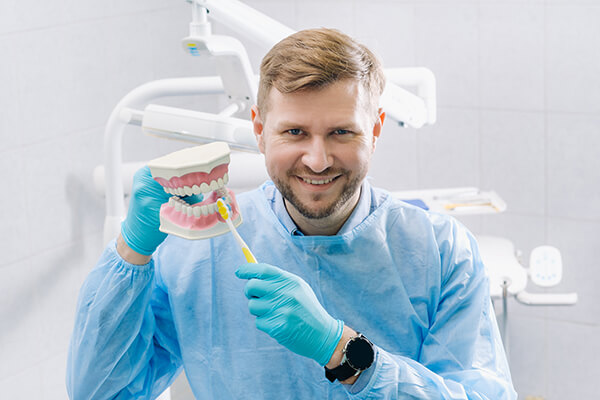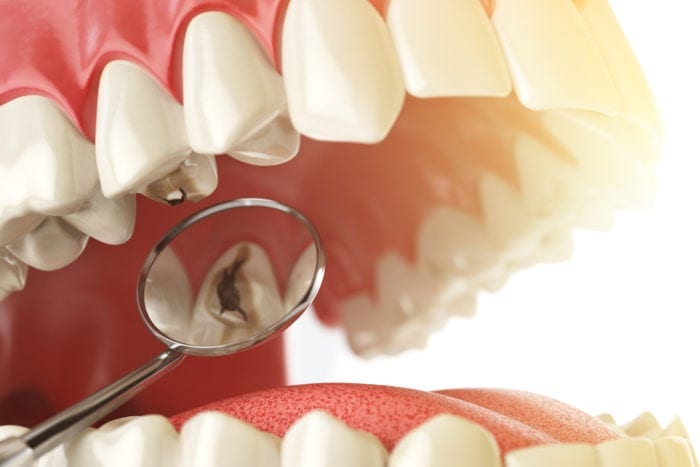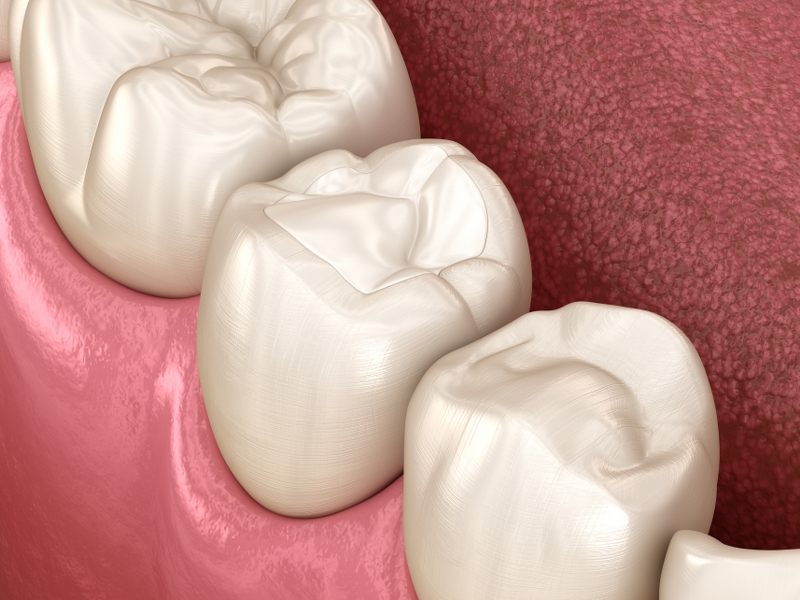Types of Dentists And When To See Each
Understanding the diverse fields of dental care is essential when it comes to addressing oral health concerns beyond the realm of general dentistry. While most individuals are familiar with visiting a general dentist for routine check-ups, it’s important to be aware of the various dental specialists available for specific oral care needs. Here, we will explore the different types of dentists and dental specialists and provide guidance on when it is appropriate to consult each of them.

Types of Dentists
When it comes to dental care, the type of dentist you need to visit can vary depending on factors such as age and specific oral health conditions. Here are the most common types of dentists:
General Dentists
General dentistry encompasses a wide range of dental services and is the most common type of dental practice, with approximately 80 percent of dental practitioners being general dentists. These professionals focus on overall teeth health and oral hygiene rather than specializing in a specific area. Here are some of the services typically offered by general dentists:
Restorative Dentistry
General dentists provide various restorative treatments to repair damaged or missing teeth. This may include dental implants, bridges, bonding (tooth-colored resin applied to repair chips or gaps), inlays and onlays (custom-made fillings), and dentures (removable replacements for missing teeth).
Cavity Fillings and Tooth Decay Treatments
General dentists are skilled in diagnosing and treating tooth decay. They perform cavity fillings using materials like composite resin or amalgam to restore the tooth’s structure and prevent further decay.


Dental Exams and Teeth Cleanings
General dentists perform routine dental exams to assess the overall oral health, check for cavities, and screen for oral diseases such as gum disease or oral cancer. They also provide professional teeth cleanings to remove plaque, tartar, and stains that may contribute to tooth decay and gum problems.
Dental X-rays
General dentists utilize dental X-rays to obtain detailed images of teeth, jawbone, and other oral structures. These images help in diagnosing dental conditions that may not be visible during a regular examination.
Fluoride Treatment
General dentists may offer fluoride treatments to strengthen the enamel and prevent tooth decay. Fluoride is applied topically as a gel, foam, or varnish.
Wisdom Teeth Removal
General dentists can perform wisdom teeth extractions. Wisdom teeth, also known as third molars, often require removal due to impaction, crowding, or other complications.
Simple Tooth Extractions
General dentists are capable of performing tooth extractions for both baby teeth and adult teeth when necessary.
General dentists play a vital role in maintaining and improving overall oral health. They offer a comprehensive range of services to address various dental needs, from preventive care to restorative procedures, promoting healthy and functional smiles for their patients.
Family Dentists
Family dentists are experienced in treating patients at every stage of life, from infants to seniors. They understand that oral care requirements differ among age groups. For instance, dental care for babies and children involves monitoring tooth development, providing guidance on proper oral hygiene practices, and addressing any early dental issues. Adults may require preventive care, restorative treatments, and cosmetic procedures to maintain oral health and improve aesthetics. Family dentists are equipped to handle the diverse dental needs of individuals across their lifespan.
By offering comprehensive dental care for the entire family, family dentists ensure that patients receive consistent oral health maintenance and timely treatment for any dental concerns, fostering good oral health habits and promoting healthy smiles for all family members. Family dentistry shares similarities with general dentistry in its emphasis on teeth health and oral hygiene. Here are some common procedures and treatments offered by family dentists:
Cavity Fillings
Family dentists diagnose and treat cavities, utilizing various filling materials such as composite resin or amalgam to restore the structure and function of affected teeth.

Sealants
Family dentists may apply dental sealants, which are thin protective coatings, to the chewing surfaces of the back teeth (molars and premolars). Sealants help prevent tooth decay by shielding vulnerable areas from plaque and bacteria.
Teeth Cleanings
Regular teeth cleanings, also known as dental prophylaxis, are an essential part of family dentistry. Family dentists perform professional cleanings to remove plaque, tartar, and stains, helping to prevent gum disease and tooth decay.
Gum Disease Treatment
Family dentists are skilled in diagnosing and treating gum disease, ranging from mild gingivitis to more severe periodontitis. They provide scaling and root planing procedures to remove plaque and calculus from below the gumline and promote gum health.

Cosmetic Dentists
Cosmetic dentistry focuses on enhancing a patient’s smile and boosting their self-confidence. While many general dentists offer cosmetic procedures, they typically undergo additional training and certification beyond dental school to specialize in this field.
Cosmetic dentistry is not a new concept, but the popularity of aesthetic treatments has been increasing. Many individuals place importance on having an attractive and healthy smile. Common cosmetic procedures and treatments include:
Teeth Whitening Treatment
Teeth whitening procedures are designed to lighten the shade of teeth, removing stains and discoloration. This treatment can significantly enhance the appearance of a patient’s smile.
Veneers
Veneers are thin shells made of porcelain or composite resin that are custom-made and bonded to the front surface of teeth. They can improve the shape, size, color, and alignment of teeth, creating a more symmetrical and aesthetically pleasing smile.
Gingivectomy (Gum Contouring)
Also known as gum reshaping, this procedure involves removing excess gum tissue to achieve a more proportionate and balanced gum line. Gum contouring can enhance the appearance of “gummy” smiles or irregular gum shapes.
Braces
Although braces are not solely considered a cosmetic treatment, they offer both functional and aesthetic benefits. Braces are commonly used to correct teeth misalignment and jaw issues, resulting in an improved bite and easier oral hygiene maintenance. Straightening crooked teeth can also enhance the overall appearance of the smile.
While cosmetic dentistry primarily focuses on improving the aesthetics of a patient’s smile, many procedures also provide functional advantages. For example, braces not only create cosmetic improvements but also address jaw misalignment and make it easier to clean between teeth, ultimately improving oral hygiene. Cosmetic dentistry offers individuals the opportunity to achieve the smile they desire, boosting their self-esteem and overall satisfaction with their oral appearance. By combining artistic skill with dental expertise, cosmetic dentists help patients achieve their aesthetic goals while considering the functional aspects of their oral health.
Choosing The Right Dentist For Your Needs
Looking for a dentist in Monroe MI? When it comes to choosing the right type of dentist for your specific dental needs, it’s essential to consider the expertise and specialized care provided by various dental specialists. While general and family dentists offer a wide array of services, dental specialists have undergone additional training and education to focus on specific areas of dentistry. Let’s explore each of the six main types of dental specialists in more detail:
Periodontists
Periodontists specialize in the prevention, diagnosis, and treatment of diseases that affect the supporting structures of the teeth, such as gums and bone.

They possess in-depth knowledge and skills in managing conditions like gingivitis (gum inflammation) and periodontitis (gum disease) through non-surgical and surgical treatments. Periodontists also specialize in procedures such as gum grafting, crown lengthening, and dental implant placement. They prioritize not only the health but also the function and aesthetics of the periodontium, ensuring optimal oral health and a beautiful smile.
Prosthodontists
Prosthodontists are experts in diagnosing and restoring missing or damaged oral tissues to their proper function. They specialize in dental restorations, including dental implants, crowns, bridges, and dentures. Prosthodontists focus on creating natural-looking and functional prosthetic solutions to improve the appearance and functionality of a patient’s teeth, jaw, and mouth. Their goal is to restore oral health, enhance aesthetics, and improve a patient’s ability to bite, chew, and speak with confidence.
Oral and Maxillofacial Surgeons
Oral and maxillofacial surgeons are highly skilled specialists who address a wide range of conditions related to the esthetic and functional features of the oral and maxillofacial region. They undergo extensive training to perform complex surgical procedures involving the mouth, jaw, and facial structures. These procedures may be necessary to treat conditions resulting from accidental injuries, trauma, diseases, deformities, tooth loss, and severe dental infections. Oral surgeons also collaborate with other dental specialists to provide comprehensive care, including wisdom tooth extractions, dental implant surgeries, corrective jaw surgeries, and facial reconstruction.
Endodontists
Endodontists specialize in the diagnosis and treatment of dental pulp diseases and periradicular tissues. They have advanced training in performing root canal procedures and surgeries related to the inner structures of the teeth. Endodontists are skilled in relieving tooth pain caused by infected or inflamed dental pulp, saving natural teeth that might otherwise require extraction. Their expertise lies in effectively treating complex root canal cases, managing dental trauma, and performing apicoectomy (surgical root-end resection) when needed.
Orthodontists
Orthodontists specialize in the diagnosis, prevention, and correction of malocclusion, which refers to improper bites caused by misaligned teeth or jaw discrepancies. They focus on improving the alignment, function, and aesthetics of the teeth and jaws. Orthodontists offer a range of treatments, including traditional braces, clear aligners (such as Invisalign, Byte, and Candid), retainers, palate expanders, and other orthodontic appliances. By straightening crooked teeth and aligning the bite, orthodontic treatment not only enhances the appearance of the smile but also improves oral health, making it easier to clean the teeth and maintain proper oral hygiene.
Pediatric Dentists
Pediatric dentists specialize in providing comprehensive dental care to infants, children, and adolescents. They undergo additional training to address the unique oral health needs of young patients and those with physical or mental challenges. Pediatric dentists focus on creating a positive and comfortable dental experience for children and ensuring their oral health from an early age. They offer preventive therapies such as dental sealants and fluoride treatments, as well as comprehensive dental treatments tailored to the specific needs of children. They are skilled in managing issues like baby bottle tooth decay, thumb sucking, and early orthodontic intervention. Pediatric dentists also educate parents and caregivers on proper oral hygiene practices and provide guidance on nutrition for optimal dental health. By fostering a positive and friendly environment, pediatric dentists help children develop good oral habits and attitudes towards dental care, setting them up for a lifetime of healthy smiles.

What To Do in Case of a Dental Need
Determining the appropriate type of dentistry you need depends on your specific dental concern. In most cases, your general dentist will be your primary point of contact for routine dental care and preventive treatments. However, there are instances where your general dentist may refer you to a specialist for specialized care or treatments they are not qualified to provide.
It is crucial to maintain regular visits to your general dentist, ideally at least once a year, for comprehensive dental examinations and teeth cleanings. These routine check-ups allow your dentist to assess your oral health, detect any potential issues at an early stage, and provide appropriate treatments or interventions. By seeking a professional opinion, you can effectively manage and address any dental problems before they worsen.
If you are experiencing any pain, discomfort, or unusual symptoms in your mouth, it is important to schedule an appointment with your general dentist immediately. They will be able to examine your mouth, diagnose the underlying cause of your symptoms, and recommend the appropriate treatment. Dental pain may indicate various issues, such as tooth decay, gum disease, or dental infections, and prompt intervention can prevent further complications.
In the case of dental emergencies, such as a chipped tooth, a filling falling out, or a tooth abscess, contacting your general dentist should be your initial step. They will be able to provide immediate guidance, offer temporary relief, and schedule an appointment for prompt treatment. If the emergency occurs outside of regular office hours, your dentist may provide instructions on how to manage the situation until you can see them or direct you to an emergency dental clinic.
Remember that your general dentist is your primary dental care provider and is equipped to handle a wide range of dental issues. They will be able to assess your needs, provide necessary treatments, and guide you if a referral to a specialist is required for more specialized or complex procedures. Regular communication with your dentist and promptly addressing any concerns will ensure that you receive the appropriate care and maintain good oral health.
What should I look for when choosing a dentist?
When choosing a dentist, several factors are worth considering:
Qualifications and Experience
Ensure that the dentist has the necessary qualifications and is licensed to practice in your area. Look for their educational background, certifications, and any additional training or specialization they may have.
Reputation and Reviews
Check for reviews and testimonials from other patients. This can provide insight into the dentist’s skills, bedside manner, and overall patient satisfaction.
Services Offered
Consider your specific dental needs and ensure that the dentist provides the services you require, whether it’s general dental care, orthodontics, cosmetic dentistry, or specialized treatments.
Location and Convenience
Choose a dentist whose office is easily accessible to you. Consider factors such as office hours, proximity to your home or workplace, and availability of parking or public transportation options.
Communication and Comfort
Look for a dentist who communicates effectively, listens to your concerns, and makes you feel comfortable. A good dentist-patient relationship is essential for successful dental care.
Cost and Insurance
Consider your specific dental needs and ensure that the dentist provides the services you require, whether it’s general dental care, orthodontics, cosmetic dentistry, or specialized treatments.
When should an individual see a dentist?
Regular dental visits are essential for maintaining good oral health. Here are some general guidelines for when you should see a dentist:
Routine Check-ups:
It is typically recommended to visit the dentist every six months for a routine check-up and cleaning. This helps prevent oral health issues and allows early detection of any potential problems.
Dental Pain or Discomfort:
If you experience persistent toothaches, gum pain, sensitivity, or any other oral discomfort, it’s important to see a dentist as soon as possible. These symptoms could indicate underlying dental problems that require attention.

Dental Emergencies:
In case of dental emergencies, such as a knocked-out tooth, severe toothache, or injury to the mouth or jaw, seek immediate dental care.
Changes in Oral Health:
If you notice changes in your oral health, such as bleeding gums, persistent bad breath, mouth sores, or unusual growths, it’s advisable to consult a dentist for an evaluation.
Remember, individual circumstances may vary, and it’s always best to consult with a dental professional who can provide personalized advice based on your specific needs.
Frequently Asked Questions
What is the highest type of dentist?
The highest type of dentist depends on how you define “highest.” In terms of education and training, all dentists earn a Doctor of Dental Surgery (DDS) or Doctor of Dental Medicine (DMD) degree. However, if you are referring to the highest level of specialization, it could be argued that oral and maxillofacial surgeons hold a prominent position. These professionals undergo additional training beyond dental school and can perform complex surgical procedures on the mouth, jaws, and facial structures.
What is the best age for first dental visit?
The best age for a child’s first dental visit is generally recommended to be around their first birthday or within six months of their first tooth erupting. This early dental visit is commonly referred to as a “well-baby” or “well-child” visit.
By taking your child to the dentist at an early age, you can establish a dental home and start building a positive relationship between your child and the dentist. Additionally, the dentist can assess the child’s oral health, provide guidance on proper oral hygiene practices, address any concerns or questions you may have as a parent, and monitor the growth and development of your child’s teeth.
Early dental visits also help in detecting and addressing any potential issues early on, such as tooth decay, developmental abnormalities, or oral habits (like thumb-sucking) that could impact oral health. It’s important to note that individual dental practices or pediatric dentists may have slight variations in their recommendations, so it’s a good idea to consult with a dental professional for specific advice tailored to your child’s needs.
How many times do we need to visit the dentist?
The frequency of dental visits can vary depending on an individual’s oral health and specific needs. However, the general recommendation is to visit the dentist for routine check-ups and cleanings every six months. Regular dental visits allow for preventive care, early detection of oral health issues, and professional cleaning to remove plaque and tartar buildup.
Keep in mind that some people may require more frequent visits if they have specific dental conditions or risk factors for oral diseases. Your dentist can assess your oral health and provide personalized recommendations on how often you should visit based on your individual needs.
Who should we visit if we have a problem with teeth?
If you have a problem with your teeth, such as tooth pain, cavities, gum disease, or other dental issues, it is best to visit a general dentist or a dental professional who can provide comprehensive dental care. General dentists are equipped to diagnose and treat a wide range of dental problems.
In some cases, depending on the complexity of the issue, your general dentist may refer you to a specialist. For example, if you require orthodontic treatment, you may be referred to an orthodontist. If you need oral surgery, you may be referred to an oral surgeon. Specialists have advanced training in specific areas of dentistry and can provide specialized care for more complex cases.
What diseases do dentists treat?
Dentists are trained to diagnose, treat, and manage various diseases and conditions related to oral health. Some common diseases and conditions that dentists treat include:
– Tooth decay (cavities)
– Gum disease (gingivitis and periodontitis)
– Oral infections
– Oral cancer
– Dental trauma (tooth fractures, dislodged teeth)
– Malocclusions (bite problems)
– Temporomandibular joint (TMJ) disorders
– Tooth sensitivity
– Oral manifestations of systemic diseases (such as diabetes or autoimmune disorders)
Dentists also play a crucial role in preventive care, educating patients about oral hygiene practices, providing dental cleanings, and offering guidance on maintaining good oral health. Regular dental visits allow dentists to monitor your oral health, detect problems early, and provide appropriate treatment or referrals to specialists when necessary.
Return to our home page at pinnacledentalgroupmi.com
